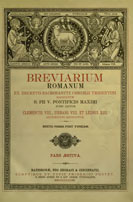Breviarium romanum ex decreto sacrosancti Concilii tridentini restitutum
“Mind you, I noticed there was something queer coming over him latterly. Whenever I’d bring in his soup to him there I’d find him with his breviary fallen to the floor, lying back in the chair and his mouth open.”
-“The Sisters” (D 16)
In 1896, The Irish Ecclesiastical Record reviewed a lavish Italian breviary, “We have received from the great house of Pustet, at Ratisbon, specimen copies of its newly-published Breviary and the Horae Diurnae which, in our opinion, are destined to have a very wide circulation in Ireland” (“Notices of Books,” Irish Ecclesiastical Review 93).
The breviary is a compendium containing a series of prayers to be read daily. The book is usually divided into four sections for each of the seasons and has five basic elements: the Psalter, the Proper of the Season, Proper of the Saints, the Common, and special Offices. As the language of the Catholic liturgy, Latin was the language of most breviaries, as is the case with the Pustet edition. However, in the late nineteenth century English language breviaries became increasingly available. William Blackwood and Sons, a publishing firm in Edinburgh and London, released a popular English translation of the Roman Missal, which sparked a controversy over the proper uses of the book. A reviewer from The Dublin Review summarized the objections in observing that “there is an idea that the Breviary is a book for priests and perhaps, also, that there is just the slightest soupçon of a heterodox leaning in wishing to put a ‘Service Book’ into the vernacular” (“Notices of Books,” The Dublin Review 289). As a book, the breviary calls for daily and even hourly cycles of reading. It attempts to order the spiritual day. In an early review of Ulysses that appeared in the New York Times, Joseph Collins wrote that although Joyce often has harsh words for his country of birth, “every day of his life, if the mails do not fail, he gets a Dublin newspaper and reads it with the dutifulness with which a priest reads his breviary” (40).

